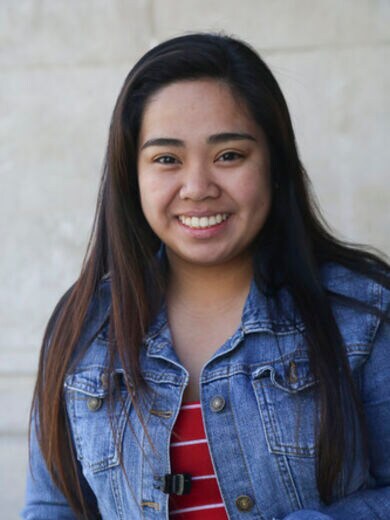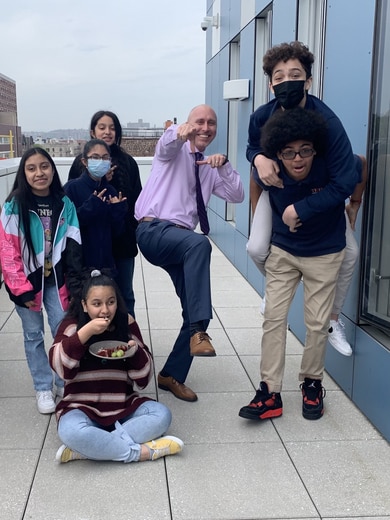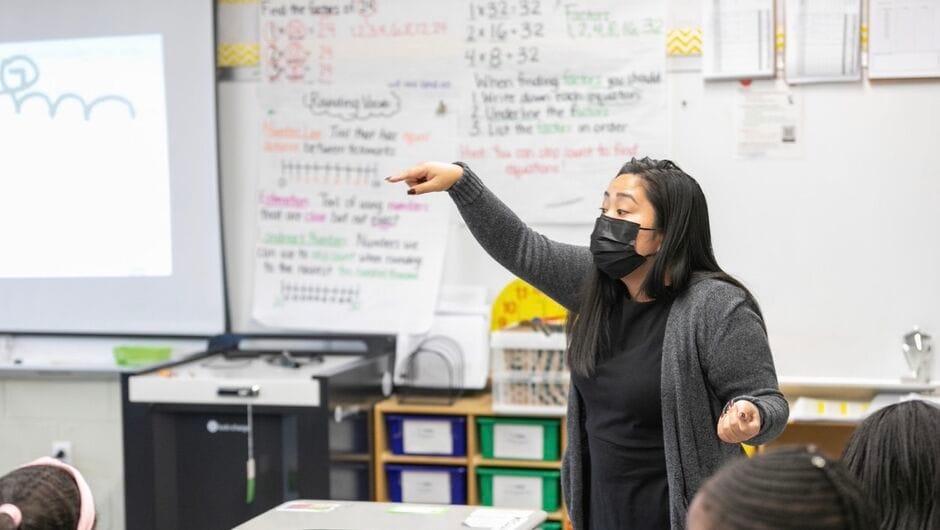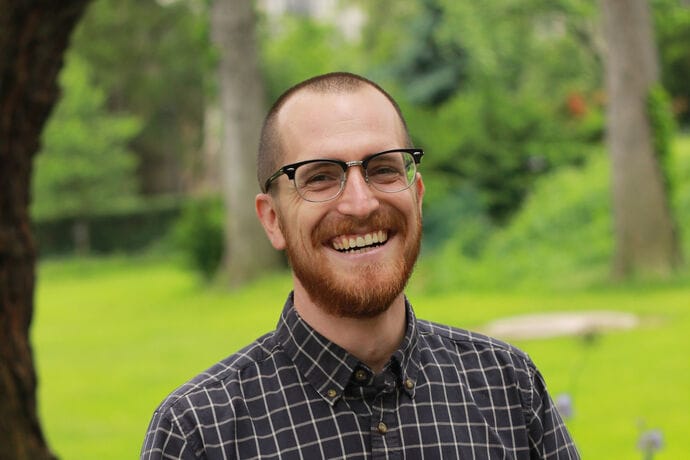To Promote Student Achievement, a NYC School Will Pay Teachers $140K

April 6, 2023
Sarah Dela Cruz was on the cusp of starting a second job when she ran into a snag. Her hours were already so long as an elementary school teacher that the department store manager couldn’t fit her into the schedule.
Dela Cruz earned $70,000 a year at the Newark, New Jersey, school where she started her career in 2016 as a Teach For America corps member. Living in New York City, where the cost of living is notoriously higher than the national average—currently 128 percent higher—Dela Cruz struggled to pay rent and the daily $12 in tolls to get to work. The anxiety of making ends meet meant it was time for a step many teachers feel forced to take—get a second job. If retail didn’t work out, she thought she might drive for Uber.
It’s a predicament that is becoming far too common for public school teachers. As teacher shortages continue to threaten student achievement across the U.S., it’s no secret that low pay leads to job dissatisfaction for teachers, forcing too many of them to work second jobs and ultimately exit the profession. About 45 percent of teachers surveyed nationally by the Teacher Salary Project in 2021 believe their pay is not high enough to keep them in the classroom for the medium to long term. A great majority—82 percent—reported working another job now or in the past.
Teacher shortages have been an issue for years, and the pandemic only worsened them in some districts, particularly those with a high proportion of students of color or students from low-income families. Meanwhile, pandemic-related disrupted learning has had dire effects on student proficiency nationwide. These crises have made educator recruitment and retention even more urgent. Some states have passed teacher pay increases in recent years, and the issue is garnering increasing bipartisan political support at the state and federal level.
Higher teacher salaries also help students. Knowing the profound effect teacher quality has on student achievement, a public charter school in New York City founded and led by TFA alums has made teacher pay a priority for 14 years. The Equity Project Charter School—known as TEP—generated headlines when it opened its doors in 2009 with teacher salaries of $125,000, which, at the time, was nearly twice as much as the average New York City public school teacher earned.
Recently, TEP school leaders announced that they’re increasing those salaries to $140,000 for the 2023-24 school year. That’s more than double the national average. It's also still significantly higher than the salary for New York City public school teachers. A teacher with 10 years experience, for instance, earns a base salary of $86,280, and a maximum salary of $101,441 (and can receive compensation for taking on additional teacher leadership roles). Teachers at TEP will also be eligible for an annual performance bonus of up to $35,000.
Dela Cruz joined the faculty at TEP in 2021 as a second grade teacher. She feels valued as a professional—and no longer needs those second jobs. And with her financial stress lifted, she is more able to be fully present for and invested in her students.
“Our kids really are the center of everything,” said Dela Cruz, who now lives in New Jersey. “The reason why we got these raises is for our kids to be our main focus.”

Higher Teacher Pay Cultivates Student Success
Located in the Washington Heights neighborhood of Manhattan, TEP is a public charter school founded by Zeke Vanderhoek, a 1998 Teach For America alum and former head of the school. Vanderhoek’s educational philosophy focused on investing in teacher quality to create better learning environments and promote academic success.
Casey Ash, TEP’s current head of school, shares that philosophy. A 1997 Teach For America alum, Ash says his TFA experience in New York “set the stage” for a career committed to achieving educational equity.

“Kids need the social, the emotional, the academic support from the highest quality, most compassionate and committed educators. And that’s what we prioritize at TEP. And that’s my commitment to our families.”
Through his work at TEP, he has seen firsthand why teacher quality is the most important school-based factor in students’ academic success, especially for those from traditionally under-resourced communities.
As a founding teacher who joined the school 14 years ago, Ash has seen the “profoundly positive impact” TEP teachers have on their students. Leveraging compensation is more important than ever, he said, as he continues to attract and retain talent to help students recover from learning gaps related to the pandemic.
“Kids need the social, the emotional, the academic support from the highest quality, most compassionate and committed educators,” he said. “And that’s what we prioritize at TEP. And that’s my commitment to our families.”
TEP has grown over the years from its initial offerings and is now composed of three campuses serving 1,080 students across grades K-8. About 91 percent of TEP’s students are Latinx, 8 percent are Black, and 90 percent qualify for free or reduced-price lunch. About 25 percent are classified as English language learners, and 22 percent receive special education services.
School leaders credit investing in teacher quality with academic improvement for TEP’s students. A 2014 study by research consultants from Mathematica found that after four years of being enrolled at TEP, middle school students had test score gains equal to an additional 1.6 years of school in math and an additional 0.4 years of school in English language arts.
Recent test scores for TEP students also show notable positive results. Test scores for a 2022 graduate cohort of TEP students show greater increases in proficiency than a New York City public school student cohort on state exams compared to 2019, according to TEP data. For example, from fifth grade to eighth grade, the TEP cohorts’ math proficiency scores increased 16 percent while the same cohort of New York City public school students’ math scores decreased 21 percent—a net difference of 37 percentage points.
Like teacher quality, higher teacher pay has been associated with greater academic achievement in students. According to a paper by researchers from The Economic Policy Institute and University of Utah, both math and English test scores are significantly higher in districts that offer higher base salaries to teachers.
“We also find that higher teacher base salaries reduce (the) achievement gap between white and Black students, as well as between white and Hispanic students, by raising test scores more for those minority students,” the paper stated.
Interested in Joining Teach For America?
Take a quiz to see if you're eligible
Reducing Costs With a Leaner Staff
In some ways, TEP is not unlike its public school counterparts. The school's student-teacher ratio is 12.5 to 1, which is comparable to the New York City public schools ratio of 14 to 1.
TEP has the same number of school days as other public schools, but, to avoid the summer slide, spreads them out across a yearlong calendar, with several breaks built into the year.
Beyond traditional academics, TEP students take music and physical education classes every day. Their day is slightly longer than most public schools to build those programs into the curriculum.
Most of TEP’s teachers have a master’s degree, at least three to five years leading a classroom, and experience working in urban settings, preferably with under-resourced communities. They also have a strong commitment to achieving educational equity, Ash said, “and the heart and compassion to support students beyond meeting just their academic needs.”
But how does TEP afford to pay teacher salaries twice the national average? Ash says it's largely the result of having a leaner staff than other public schools of similar size. That means there are no deans and fewer assistant principals. Teachers have additional roles built into their job, known as a “whole school service role.”
Dela Cruz, for example, teaches the second grade and runs a tutoring program for about 15 struggling students. She also creates homework assignments for the entire second grade. Some teachers fulfill special education coordinator, instructional supervision, or instructional coaching positions, which typically are standalone positions at other schools. Campus directors and assistant directors have classroom assignments, teaching one or two periods a day.

“I know that I’m being compensated for what I do and everything that I’m working towards is solely for my kids and not because I have to make that next check.”
“We have fewer staff members than other public schools that serve comparable numbers of students and we do not pretend otherwise. I think that’s part of what the commitment from our teachers involves. We count on our teachers to take on leadership roles that might otherwise exist sometimes as separate standalone positions in other schools,” said Ash, who fills in for math and literacy class teachers on parental leave.
Ash said TEP does not fundraise to support operating expenses. “We minimize administrative overheads and therefore we’re able to sustain the staff compensation through responsible fiscal planning and allocation. And I say that because it’s important for us to demonstrate that a school can pay its teachers at this level and can do so without any external funding to make it happen.”
Higher Salaries Support Teachers & Students
News of the raises at TEP was met with applause from the teachers, and in at least one meeting, screams of excitement, Dela Cruz said. In describing the mood in the room, she said teachers felt “like the work we were doing was being seen; it was being rewarded. Everything that we have been struggling through the past few years with the pandemic—everything was just coming together and… made all of us feel like we’re in the right place doing the right thing.”
TEP’s compensation philosophy means that Dela Cruz doesn’t have to bring her worries about making rent or getting a second job with her to the classroom. “Those thoughts aren’t really in my head at this point because I know that I’m being compensated for what I do and everything that I’m working towards is solely for my kids and not because I have to make that next check,” she said.
The daughter of Filipino immigrants, Dela Cruz said the raise also gives her the means to help support her parents. In addition, the TEP salary gives her the opportunity to ensure she’s meeting her physical and mental health needs, which aren’t always covered by standard health insurance, and complete a graduate degree. She plans to enroll in a master’s of education program for TFA alumni through Johns Hopkins University.
One of her colleagues, TFA alum Tom Tafejian, teaches fourth grade music and leads an after-school choir that performs at TEP and around the city. Tafejian started his career teaching in the Mississippi Delta in 2011, earning $30,000 a year. Originally an apprentice when he joined TEP in 2015, he became a master teacher a year later.

After a brief stint at another school, he returned to TEP in 2020. Earning $125,000 annually has helped him keep up with the cost of living in New York City. It has also allowed him to build savings.
As Tafejian looks forward to starting a family soon with his wife, he said the upcoming $15,000 raise “is definitely something that makes life easier.” Teacher pay is important, he said, as are other reforms educators need to improve teacher recruitment and retention.
“When young people are considering what field to go into, I assume many choose not to go into teaching because they see other more lucrative career options. When teachers are in the classroom, many get burned out after a while and then make the decision to leave the field when they realize that they could be making more money elsewhere and also have a less stressful day to day,” Tafejian said. He added that in addition to equitable pay, teachers “want to be valued and supported by their administration and colleagues, be part of a strong community, have autonomy over what and how they teach, and take pride in the meaningful work they do."


